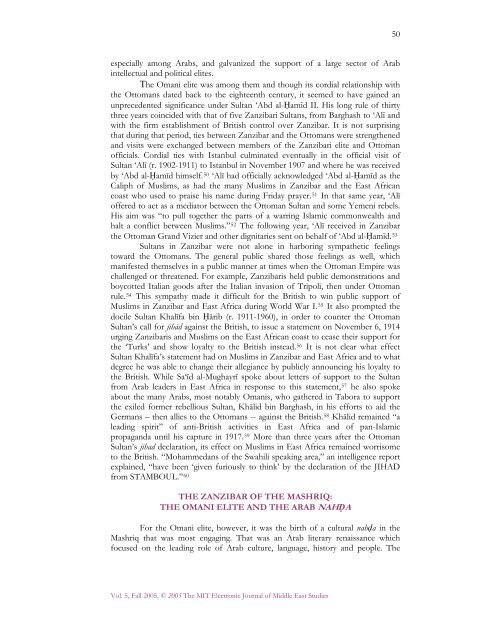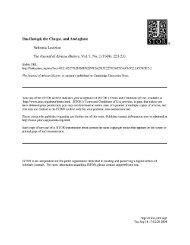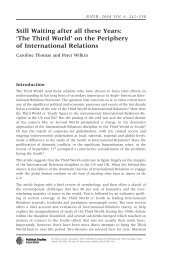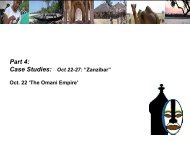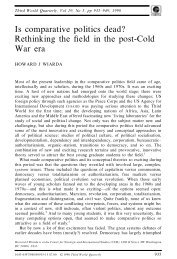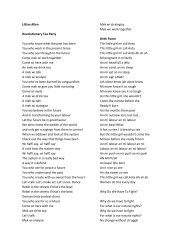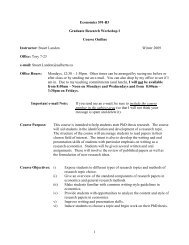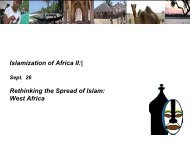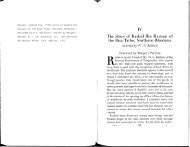personal memories revolutionary states and indian ocean migrations
personal memories revolutionary states and indian ocean migrations
personal memories revolutionary states and indian ocean migrations
Create successful ePaper yourself
Turn your PDF publications into a flip-book with our unique Google optimized e-Paper software.
especially among Arabs, <strong>and</strong> galvanized the support of a large sector of Arab<br />
intellectual <strong>and</strong> political elites.<br />
The Omani elite was among them <strong>and</strong> though its cordial relationship with<br />
the Ottomans dated back to the eighteenth century, it seemed to have gained an<br />
unprecedented significance under Sultan ‘Abd al-Ḥamīd II. His long rule of thirty<br />
three years coincided with that of five Zanzibari Sultans, from Barghash to ‘Alī <strong>and</strong><br />
with the firm establishment of British control over Zanzibar. It is not surprising<br />
that during that period, ties between Zanzibar <strong>and</strong> the Ottomans were strengthened<br />
<strong>and</strong> visits were exchanged between members of the Zanzibari elite <strong>and</strong> Ottoman<br />
officials. Cordial ties with Istanbul culminated eventually in the official visit of<br />
Sultan ‘Alī (r. 1902-1911) to Istanbul in November 1907 <strong>and</strong> where he was received<br />
by ‘Abd al-Ḥamīd himself. 50 ‘Alī had officially acknowledged ‘Abd al-Ḥamīd as the<br />
Caliph of Muslims, as had the many Muslims in Zanzibar <strong>and</strong> the East African<br />
coast who used to praise his name during Friday prayer. 51 In that same year, ‘Alī<br />
offered to act as a mediator between the Ottoman Sultan <strong>and</strong> some Yemeni rebels.<br />
His aim was “to pull together the parts of a warring Islamic commonwealth <strong>and</strong><br />
halt a conflict between Muslims.” 52 The following year, ‘Alī received in Zanzibar<br />
the Ottoman Gr<strong>and</strong> Vizier <strong>and</strong> other dignitaries sent on behalf of ‘Abd al-Ḥamīd. 53<br />
Sultans in Zanzibar were not alone in harboring sympathetic feelings<br />
toward the Ottomans. The general public shared those feelings as well, which<br />
manifested themselves in a public manner at times when the Ottoman Empire was<br />
challenged or threatened. For example, Zanzibaris held public demonstrations <strong>and</strong><br />
boycotted Italian goods after the Italian invasion of Tripoli, then under Ottoman<br />
rule. 54 This sympathy made it difficult for the British to win public support of<br />
Muslims in Zanzibar <strong>and</strong> East Africa during World War I. 55 It also prompted the<br />
docile Sultan Khalīfa bin Ḥārib (r. 1911-1960), in order to counter the Ottoman<br />
Sultan’s call for jihād against the British, to issue a statement on November 6, 1914<br />
urging Zanzibaris <strong>and</strong> Muslims on the East African coast to cease their support for<br />
the ‘Turks’ <strong>and</strong> show loyalty to the British instead. 56 It is not clear what effect<br />
Sultan Khalīfa’s statement had on Muslims in Zanzibar <strong>and</strong> East Africa <strong>and</strong> to what<br />
degree he was able to change their allegiance by publicly announcing his loyalty to<br />
the British. While Sa‘īd al-Mughayrī spoke about letters of support to the Sultan<br />
from Arab leaders in East Africa in response to this statement, 57 he also spoke<br />
about the many Arabs, most notably Omanis, who gathered in Tabora to support<br />
the exiled former rebellious Sultan, Khālid bin Barghash, in his efforts to aid the<br />
Germans – then allies to the Ottomans -- against the British. 58 Khālid remained “a<br />
leading spirit” of anti-British activities in East Africa <strong>and</strong> of pan-Islamic<br />
propag<strong>and</strong>a until his capture in 1917. 59 More than three years after the Ottoman<br />
Sultan’s jihad declaration, its effect on Muslims in East Africa remained worrisome<br />
to the British. “Mohammedans of the Swahili speaking area,” an intelligence report<br />
explained, “have been ‘given furiously to think’ by the declaration of the JIHAD<br />
from STAMBOUL.” 60<br />
THE ZANZIBAR OF THE MASHRIQ:<br />
THE OMANI ELITE AND THE ARAB NAHḌA<br />
For the Omani elite, however, it was the birth of a cultural nahḍa in the<br />
Mashriq that was most engaging. That was an Arab literary renaissance which<br />
focused on the leading role of Arab culture, language, history <strong>and</strong> people. The<br />
Vol. 5, Fall 2005, © 2005 The MIT Electronic Journal of Middle East Studies<br />
50


